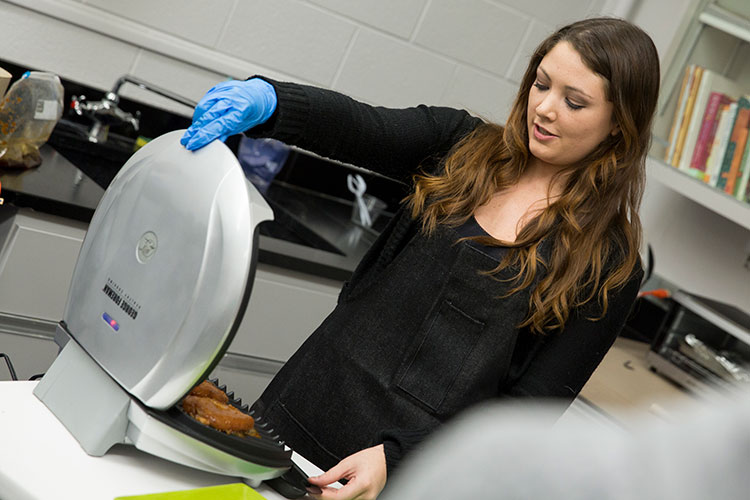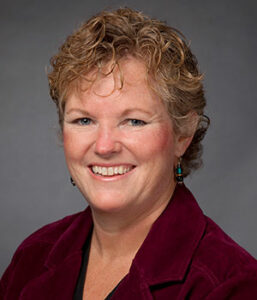BS: Nutritional Sciences BS
Interested in the wonderful world of nutrition and dietetics? Then you have come to the right place for a nutrition degree!
It may seem rather simplistic at first glance – eat a little more of this, a little less of that – but an education in nutrition is far more exciting and multifaceted than first meets the eye (and stomach!).
Program Type
Major
Program Format
On Campus
Nutritional Sciences is…
A science that investigates the body’s metabolic and physiological responses to the food we consume and explores the role of food and nutrients in the development, treatment and prevention of disease.
It grapples with understanding and leveraging the web of factors that shape what, when, how much, where and with whom we eat.
Nutrition professionals can positively impact the lives of others in many different ways including facilitating dietary behavior change, enhancing the food environment and expanding food and nutrition security and reducing hunger among individuals, groups and communities.

The BS Nutritional Sciences degree provides you with a strong foundation in the biological and social sciences so you can understand, navigate, interpret, apply and communicate evidence-based relationships between food, nutrients, eating behavior and human health.
Courses offered by Nutritional Sciences faculty and staff also respect and honor the important role food and food-related traditions serve in a multicultural, diverse society.
Additionally, this nutrition degree is structured to be highly customizable so you can pursue a program of study that aligns with your interests and career goals — with room to pursue a minor or certificate program to further enhance your academic experience.
Professional Titles/Credentials
The professional titles/credentials in the field of nutrition and dietetics include:
- Registered Dietitian (RD) or Registered Dietitian Nutritionist (RDN) which requires at least a master’s degree starting January 1, 2024
- Nutrition & Dietetic Technician, Registered (NDTR) which requires an associate degree or higher.
You can earn these credentials by completing a program accredited by the Accreditation Council for Education in Nutrition and Dietetics (ACEND), which includes coursework and/or supervised practice, and then passing a national credentialing exam. Learn more about the various pathways to become an RDN or NDTR.
Although the BS Nutritional Sciences is not an ACEND-accredited program, the coursework can be customized to prepare you to apply to graduate-level dietetics programs including UWM’s Master of Public Health (MPH) – Nutrition and Dietetics.
Most of the prerequisite courses required for admission to such programs are built directly into the nutrition degree. If you are interested in pursuing the RDN credential, contact your advisor to add Pre-Dietetics to your undergraduate program of study. More information can be found in the Pre-Dietetics section of the Catalog.
Beyond Dietetics
The nutrition degree is a valuable undergraduate degree even if you are not interested in pursuing the RDN credential. Because of required foundational coursework in the natural and social sciences, combined with the rich array of nutritional sciences courses, you will graduate ready to apply your knowledge and skills in many professional settings including health care, food and neutraceutical industries, community nutrition and public health organizations, and fitness/wellness companies.
If you are interested in continuing your education beyond the bachelor’s degree, you will be well-positioned for graduate education in a wide-array of fields, as well as for professional degree programs in public health, medicine, dentistry, pharmacy and more!
Want to get started in the Nutritional Sciences major or sample some courses in this dynamic, exciting field of study?
Consider enrolling in one or more of these nutrition degree introductory courses (no prerequisites required):
- NUTR 101 New Student Seminar in Nutritional Sciences & Pre-Dietetics. This 1-credit fall course will introduce you to the field of nutritional sciences and dietetics, career opportunities, and how to maximize your time studying this discipline at UWM.
- NUTR 110 Introduction to Food Principles & Preparation. This 3-credit hands-on course is offered every fall and spring semester in the Applied Foods Lab in Enderis Hall. You will build life skills related to food preparation all the while learning more about nutritional sciences through the science of food.
- NUTR 230 Health Aspects of Exercise and Nutrition. This 3-credit course will introduce you to key concepts related to personal physical fitness and healthy eating. If you are interested in learning about and improving your own fitness and eating behaviors, this is a great class to take. Plus it counts as a Natural Science GER!
- NUTR 241 Why We Eat What We Eat: An Ecological Approach. To facilitate dietary change, it is critical to understand what drives behavior. This 3-credit course offered in the fall and summer offers you the opportunity to “dig-in” to the complex array of influences – both seen and unseen – that shape an individual’s food choices and eating behavior. Plus it counts as a Social Science GER!
Employment Outlook
BS in Nutritional Sciences graduates can be employed by a wide-variety of organizations:
- Community nutrition programs (Women, Infants, & Children – better known as WIC, nutrition education programs)
- Non-governmental organizations
- Fitness/wellness companies
- Major research centers
- Biotechnology, pharmaceutical and nutraceutical industries
Specialized skills or training such as service learning with local, national, or international community organizations, research experience, bilingual proficiency, or journalism courses and experience, make students more competitive for other specialized jobs, including:
- Food security advocacy groups (food banks, anti-poverty organizations)
- Health advocacy organizations (preventing osteoporosis, cancer, or heart disease)
- Groups/agencies working to increase food security (farmers’ market organizers, Supplemental Nutrition Assistance Program [formerly called food stamps] as educators or administrators).
Graduates with a BS in Nutritional Sciences can further their education through:
- Graduate programs in dietetics, such as UWM’s MPH – Nutrition and Dietetics.
- Medical school
- Dental school
- Schools of osteopathy, pharmacy, podiatry, optometry, physical therapy, and physician assistant programs.
According to the Occupational Outlook Handbook, employment opportunities are expected to increase about as fast as the average for all occupations. Job growth will result from an increasing emphasis on disease prevention through improved dietary habits. A growing and aging population will boost demand for nutrition-related programming and expertise in hospitals, residential care facilities, schools, prisons, community health programs, and home healthcare agencies. Public interest in food and nutrition, and increased emphasis on health education, will also spur demand for professionals in this field.
Declaring Your Intent
If you are currently a UWM student and wish to change your major to “Nutritional Sciences-Intended,” you must meet with an academic advisor to do so. Your advisor will guide you through the declaration process and application to the major. If you are interested in becoming a registered dietitian nutritionist (RDN), please be sure to inform your advisor that you would like to consider incorporating pre-dietetics into your program of study.
Admission Prerequisites
Students interested in pursuing the B.S. Nutritional Sciences are considered “Nutritional Sciences-Intended” and encouraged to apply to the major as soon as they are eligible. To be eligible for admission to the major, students must have completed a minimum of 15 credits, earned a cumulative grade point average (GPA) of 2.50 or higher, and specific prerequisite courses must be completed (or in progress) with a minimum grade of C:
- NUTR 101 New Student Seminar in Nutritional Sciences & Pre-Dietetics
- Six credits of NUTR courses required for the major (BMS 232 Introduction to Nutrition is included as an option)
- CHS 100 New Student Seminar in the Health Professions
- OWC-A (ENGLISH 102 or equivalent)
- BIO SCI 150 Foundations of Biological Sciences I OR BIO SCI 202 Anatomy and Physiology I
- CHEM 101 Chemical Science OR CHEM 102 General Chemistry
- Students are strongly encouraged to consult with the Nutritional Sciences Advisor or Program Director to determine which introductory chemistry course best fits their educational interests and career goals.
All students are eligible to pursue general education requirements and foundations courses associated with the curriculum as long as they meet the necessary prerequisites for each course.
Application Submission
The application to the nutrition degree program is available during the months of September and February. Applications are due October 1st for spring admission and March 1st for summer/fall admission. The application may be submitted while some required courses are in progress as long as they will be completed prior to the effective admission term. Be sure to meet with your Academic Advisor every semester to identify the best time for you to apply.
Applicants are notified of their admission status via email from the Program Director within 4 weeks of the application deadline.
The curriculum below is for students beginning the nutrition degree program on or after September 1, 2022. Existing Nutritional Sciences students may opt-in to the new curriculum if they wish and should contact their advisor for guidance. Download curriculum for prior to Fall 2022 (PDF).
The BS in Nutritional Sciences is ideal preparation for many ACEND-accredited graduate-level dietetics programs, such as UWM’s MPH-Nutrition and Dietetics program. Most of the prerequisite courses required for admission to such programs are built directly into the undergradate degree. Learn more about customizing the B.S. Nutritional Sciences curriculum with pre-dietetics coursework.
Nutritional Sciences Major Requirements
To fulfill the requirements for the Nutritional Sciences Major, students must complete the following: (a) University General Education Requirements, (b) Foundation Courses, (c) Nutritional Sciences Required Courses, and (d) Upper Level (300- or above) Nutritional Sciences Elective Courses, and (e) Elective Courses.
| Code | Title | Credits |
|---|---|---|
| Foundation Courses 1 | ||
| BIO SCI 150 | Foundations of Biological Sciences I | 4 |
| BIO SCI 202 | Anatomy and Physiology I | 4 |
| BIO SCI 203 | Anatomy and Physiology II | 4 |
| KIN 270 | Statistics in the Health Professions: Theory and Practice | 3 |
| CHEM 103 | Survey of Biochemistry 2 | 3-5 |
| or CHEM 501 | Introduction to Biochemistry | |
| PH 101 | Introduction to Public Health | 3 |
| PSYCH 101 | Introduction to Psychology | 3 |
| or SOCIOL 101 | Introduction to Sociology | |
| COMMUN 103 | Public Speaking | 3 |
| CHS 100 | New Student Seminar in Health Professions | 1 |
| BMS/KIN 245 | Client Diversity in Health Sciences: An Interdisciplinary Perspective | 3 |
| Cultural Diversity + Humanities (Choose a course that meets both GER categories) | 3 | |
| MATH 105 | Introduction to College Algebra | 3 |
| or MATH 108 | Algebraic Literacy II | |
| Select one of the following: | 3 | |
| ENGLISH 205 | Business Writing | |
| ENGLISH 207 | Health Science Writing | |
| ENGLISH 310 | Writing, Speaking, and Technoscience in the 21st Century | |
| Nutritional Sciences Courses | ||
| NUTR 101 | New Student Seminar in Nutritional Sciences & Pre-Dietetics | 1 |
| NUTR 110 | Introduction to Food Principles & Preparation | 3 |
| BMS 232 | Introduction to Nutrition | 3 |
| NUTR 230 | Health Aspects of Exercise and Nutrition | 3 |
| NUTR 241 | Why We Eat What We Eat: An Ecological Approach | 3 |
| NUTR 245 | Life Cycle Nutrition | 3 |
| NUTR 350 | Nutrition Communication and Education | 3 |
| NUTR 355 | Modifying Nutrition and Eating Behavior | 3 |
| NUTR 435 | Nutrition and Disease Prevention | 3 |
| NUTR 470 | Nutritional Sciences Capstone Experience | 3 |
| NUTR courses 300 level or above 3 | 9 | |
| Electives (credits will vary by student) 4 | 43 | |
| Total Credits | 120 |
1 Some courses listed in this section may also partially fulfill a student’s General Education Requirements.
2 CHEM 501 has organic chemistry-related prerequisites that must be satisfied before enrolling.
3 Students must complete NUTR 305 Hunger at Home: Food Insecurity in Milwaukee County or NUTR 555 Public Health Nutrition and Food Politics.
4 Students may select elective coursework that aligns with their interests, as well as educational and professional goals. The number of elective credits needed to meet the 120 credit requirement to be awarded the B.S. Nutritional Sciences degree will vary somewhat student to student depending upon the Chemistry sequence chosen.
Program Retention and Graduation Requirements
Nutritional Sciences program faculty and staff are deeply committed to facilitating student success. Regular open, honest communication with the Program Advisor, Program Director, and Program faculty and staff is strongly encouraged and will help students succeed in the program.
Once admitted to the nutrition degree program, students must maintain a minimum cumulative GPA of 2.50 and earn a grade of C or better in all Nutritional Sciences (NUTR) courses counting towards degree requirements. Should the need arise, Nutritional Sciences (NUTR) courses counting towards degree requirements may be repeated once; no courses repeat restrictions are placed on other courses. If a student’s cumulative UWM GPA falls below 2.50, they will be placed on academic probation and encouraged to meet with the Program Advisor to develop an action plan. Students who remain on academic probation for more than two consecutive semesters, or exceed the course repeat policy, will be dismissed from the major and advised about other potential degree options.
To graduate with a B.S. in Nutritional Sciences, students must:
- Complete a minimum of 120 credits.
- Complete all University General Education Requirements.
- Have earned credit in all required courses (including transfer courses) counting towards degree requirements.
- Earn a minimum cumulative UWM GPA of 2.50 (including transfer courses) counting towards degree requirements.
- Earn a grade of C or better in all NUTR courses (including transfer courses), counting towards degree requirements.
- Complete the last 30 credits in residence at UWM.
The pursuit of a minor or Certificate is encouraged and should easily integrate into a plan of study. Please consult with your advisor for guidance.
Students interested in pursuing a graduate program in dietetics, like UWM’s MPH-Nutrition and Dietetics program, should note that admission to such programs is competitive and specific admission requirements vary. To maximize the likelihood of admission, it is recommended that pre-dietetics students strive to attain a 3.0 cumulative GPA (or higher) and 3.0 GPA (or higher, with no grade lower than C) for any pre-dietetics courses.
Undergraduate students in Nutritional Sciences and/or Pre-Dietetics are advised by Kelsi Faust. Contact Kelsi at 414-251-6070 or meyer378@uwm.edu.
Students who wish to learn more about Pre-Dietetics and/or pathways leading to the RDN credential are also encouraged to contact Kelsi Faust or Lori Klos, MPH-Nutrition and Dietetics Program Director, Nutritional Sciences Undergraduate Program Director (414-251-8220, lklos@uwm.edu).
When should I meet with my advisor?
As soon as you decide to declare your major as “Nutritional Sciences-Intended,” reach out to Kelsi Faust as soon as possible for initial guidance. After that, you are encouraged to meet with your advisor at least once per semester to ensure timely progress to graduation.
- Enrolling for spring semester?
Schedule an appointment with your advisor in October or November. - Enrolling for fall semester?
Schedule an appointment with your advisor in March or April.
You are also welcome to schedule an appointment with your advisor at any time to discuss academic challenges, career opportunities, or any other questions.
How can my advisor help me?
The Zilber College of Public Health boasts professional academic advisors who understand the challenges of balancing academics, work, family and the social aspects of college life. Advisors partner with you to:
- Explore your academic and career interests
- Plan the sequence of your courses
- Prepare for course enrollment
- Access tutoring and other academic support
- Identify opportunities for campus involvement
- Connect you to campus resources
- Plan for graduation
- Associate Professor, Nutritional Sciences Undergraduate Program Director, MPH-Nutrition & Dietetics Program Director
- lklos@uwm.edu
- 414-251-8220
- Enderis Hall 455
- Clinical Professor Emeritus, Nutritional Sciences
- Clinical Associate Professor
- ltaylor@uwm.edu
- 414-251-8546
- Enderis Hall 463




